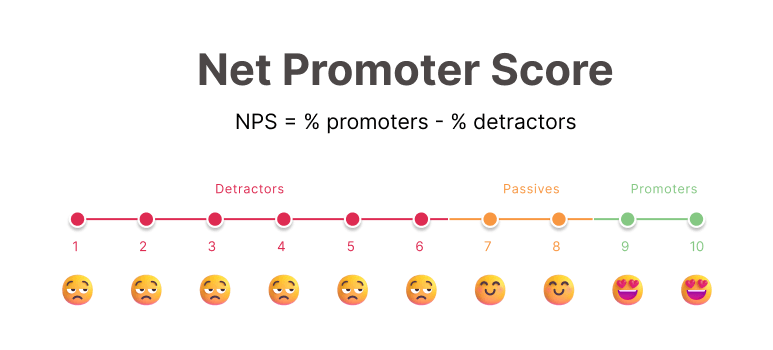Net Promoter Score
What is Net Promoter Score?
A one-question survey-based metric, the Net Promoter Score examines respondents’ likelihood of recommending a company, product, or service to a friend or colleague. Typically ranging from 0 to 10, the score provides insights into the brand’s overall impressions.
Moreover, companies frequently use NPS to assess customer satisfaction and identify areas for improvement.
A simple yet effective measure, it provides a quick snapshot of consumer perspective and their likelihood to recommend your business. Therefore, businesses frequently use it to analyze customer loyalty, track changes, and promote a customer-centric strategy.
Based on the scores calculated through NPS, businesses categorize customers into three different groups.
These are:
1. Promoters (9-10): Customers who are willing to buy more and recommend others. Efforts should be made by brands to retain and encourage Promoters (9-10).
2. Passive (7-8): Customers who are satisfied but vulnerable to competition, and they are more likely to churn. Efforts should be made by brands to convert Passive (7-8) customers.
3. Detractors (0-6): Customers who are unhappy with the brand. A proper analysis should be carried out by brands for Detractors (0-6), to understand the areas of issue and correct them as needed.

Why NPS (Net Promoter Score) is Important
Net Promoter Score (NPS) is critical because it measures customer loyalty and their willingness to recommend a brand. Moreover, it offers actionable insights into customer satisfaction. NPS is a straightforward metric that directly correlates with business growth. It highlights areas for improvement, guides customer-centric strategies, and encourages continuous enhancement of the overall customer experience by categorizing respondents as promoters, passives, or detractors.
Businesses find the Net Promoter Score (NPS) a helpful tool for gathering feedback on customer experiences. Whether it’s right after using a product or months later, these insights help businesses understand user satisfaction and improve the overall customer experience.
NPS scoring works well in different industries, helping organizations measure customer satisfaction. Whether after shopping or making a purchase, businesses ask customers the NPS question to understand how they’re doing and improve the customer experience.
Benefits of Using NPS
The Net Promoter Score (NPS) provides numerous advantages by quickly assessing customer loyalty and satisfaction based on their likelihood to recommend a brand. This metric provides actionable insights to businesses, allowing them to improve customer experiences, identify and address concerns, foster brand advocates, benchmark against competitors, and drive organic growth through positive word-of-mouth marketing, ultimately guiding strategic decisions and optimizing overall business performance.
